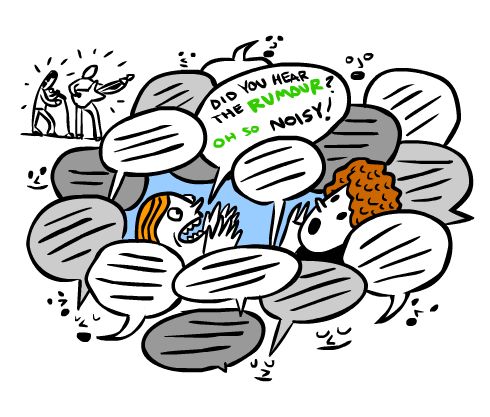Italian for noisy
Have you heard the rumor?

rumoroso (m) = noisy in Italian
Just imagine a very noisy bar full of
RUMOR - OH SO noisy!"
rumoroso sounds very similiar in English to RUMOR ... so we've used this connection for our Memory Trigger, incorporating it as a link between the Italian word and the English sound.
Visualise the picture and imagine the next time you're in a bar it's very noisy, and all you can hear are people spreading gossip and RUMOR, OH SO much rumor ...
Sentences - the word in action.
See and hear a sample sentence of every word, like Italian for noisy.
Native Italian speakers use commonly-used everyday sentences. Practise listening to natural Italian intonation. Practise writing the sentences as well, with many useful new expressions for you to learn.
The Sentences run as an independent course, with lessons, and tests and learning schedules. They can also be accessed from the word course, just by clicking on the picture.
Great for extension practice and enhancing your learning.
Questo ristorante è pulito ma rumoroso.
This restaurant is clean but noisy.
e-Flashcardz - photographic visuals

For those who prefer more traditional rote-learning, try the Flashcard option. Totally interactive, with cool photos. Give it a try as an alternative, or test yourself when you feel confident you have memorised a word.
Great photographic visuals to complement the Memory Trigger cartoons - ideal for testing and revision stages.
Click the button to switch between the Memory Trigger and e-Flashcardz modes whenever you wish.
Pronouns
These are the personal pronouns for I, he, she, it, they and the various forms of you (formal or informal, singular or plural).
io = I
tu = you - informal, singular
lui, lei, Lei = he, she (& it), you (formal singular)
noi = we
voi, Voi = you (plural - informal & formal
loro = they
Every verb has a different end for each person/pronoun. The pronouns are often dropped in speech, the verb ending and context usually being sufficient to know who is being spoken about.
However, there are occasions they will be used, namely:
If the sentence is ambiguous.
Does the shirt belong to you (formal,singular)? Does the shirt belong to her?
For emphasis:
I'm not the one to blame.
In certain expressions:
sono io = it is I / it is me
you (singular) - informal or formal?
tu - informal - use for family, friends, people your own age or younger
Lei - formal - use when addressing a stranger or a superior or older person you don't know well.
Lei is usually written with a capital letter.
Learn More about the 200 Words a Day! Italian Courses and how will they work for you.
|
|---|
200 Words a Day! Learn Italian for noisy
*Cartoon by Mitch Loldoit
200 Words a Day! and Exceltra
©Copyright
2004-2023 All Rights Reserved





New! Comments
Have your say about what you just read! Leave us a comment in the box below.